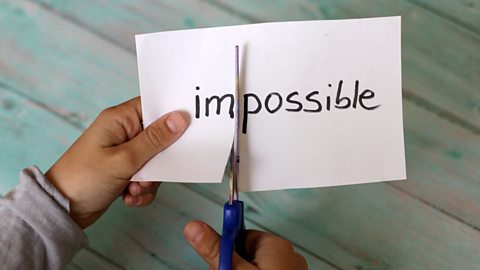This article was first published in March 2021
If you’ve ever had a good cry to a sad song or felt the urge to get up and dance when an awesome track comes on the radio, you’ll know that music can affect the way we feel. But can we use music to help us manage our moods and if so how?
DJ Nick Grimshaw caught up with Professor Catherine Loveday from the University of Westminster to find out how music can help our wellbeing.
Nick: Hello, I'm Nick Grimshaw from łÉČËżěĘÖ Radio One and we are talking all about the relationship between music and wellbeing. We've all been in that mood when we've been not feeling great and we've turned to music, put the radio on, heard a song and it's helped us feel better, it's elevated our mood. But how does it actually work? I'm going to be catching up with Professor Catherine Loveday to find out how music affects our wellbeing. Hi Catherine!
Catherine: Hi.
Nick: How are you?
Catherine: I'm good thank you.
Nick: So, This is really interesting to me, like, music's a massive part of my life. I love listening to music. But how can it actually help our wellbeing, and can it?
Catherine: Yeah, we've known for many years that it is very good for our health and you can see that measurably in the body. So we can see changes in stress chemicals in the body, but also we can see changes in our immune response and our heart rate and so on. So it makes a really good, sort of, physical impact on our body. But it's also really interesting to look at the ways in which it helps our wellbeing, so it really can help us with relaxation. It can help us regulate our emotions, it can motivate us, it can absorb and engage us, it can help us to study, it can help us to sleep. So, it's really, really good for lots of different aspects of our wellbeing.
Nick: How does it do that? How does it regulate our emotions?
Catherine: Well, this is a really good question, and I don't know that we do know exactly how it does, but we do know that it does, because we can see that in brain imaging studies. We can see that people's emotion centres light up and people report using it to regulate their emotions. So if they're feeling sad, sometimes listening to sad songs can be really helpful. It can help us to reflect, it can help us feel like we have got somebody there with us who's reflecting our feelings. But if we want to be kind of picked up or if we were in a good mood or want to be with friends. Then it can help us by playing much faster music or much more upbeat music.
Nick: I do that, like, when I'm out and about and if I'm going on a journey, I'll sort of change the music as I approach wherever I'm going to. So, if I know I'm going in to work or I've got a busy day, like, I'll start with slower stuff, and as I approach work, I'll have something really uplifting and really motivating to get me in the right headspace.
Catherine: Yeah, and we've seen in our research that people will often play music that really sets them up for something, so people who are about to go on stage or who are about to perform, you know, do sport or something, they will often choose a very particular track that they play every time because it puts them in the right place and the right frame of mind.
Nick: What sort of music should we be listening to, to say, if we want to feel motivated, what works?
Catherine: Well, fundamentally, it really depends on the person. So what we do know from all of our research is there is no magic answer, it depends on what you like and what mood you're in. But what we do know, of course, is that faster music, more upbeat music is going to do a better job of making you, sort of, want to get up and dance. So, if you're sitting around doing nothing and you put your favourite, really kind of, driving track on, it's just gonna make you want to move. We are compelled to do that, our cerebellum in the back of a brain wakes up and we just want to move. And we know that it really improves exercise performance. So if people use music to exercise then you see that they run faster, they enjoy the run more, they feel like they haven't run as far, and you can even see improved oxygen consumption and then you can use music to calm me down again afterwards as well and bring you back down to a nice calm place.
Nick: So we know music can help with motivating, what about bedtime? What about when we're trying to get to sleep, does music actually help us get a better night's sleep?
Catherine: It's certainly very popular. So, surveys showed that it's one of the most popular ways that people like to calm themselves down before sleep and it's also a really popular way for people to relax and rest, and we do know from various studies that people sleep a bit better and they feel a little bit better in the morning. It's even been shown to improve depressive symptoms in people listening to forty-five minutes of calming music before they go to sleep. So, it can be a really nice way to put you in a nice, relaxed, gentle mood before you go to sleep and of course, what you listen to will depend on you, but we do know that quiet, calming, soothing lullaby-type music is going to have a really nice impact.
Nick: Hmm, it does feel good, I will say that you have music on before bed. You can feel your muscles relaxing in your body.
Catherine: You know, we can see that in studies. You can see the change in the chemistry of the body and the changes that happened in the brain. It's very real what's going on when that happens.
Nick: I love that, that's amazing. What about studying? What about when you've got to revise? You've got to do your homework? Is music a good thing to have on when you're learning?
Catherine: So this is really controversial. I get asked this all of the time, and fundamentally what we know from the research, is that people are very good at making this decision. So although often teachers and parents will say, Oh, they shouldn't be listening to music and studying, we know that that's not really true. What it does depend on is your personality, what the task is, what kind of music you're listening to. So if you're doing a piece of artwork, then having kind of lively, lyric-filled music on is absolutely fine. But if you're trying to write an English essay, then you might find that any lyrics are going to put you off and you might find that it's just too distracting, so it's all about balancing up how distracting the music is from how much it's kind of, maybe, making you feel a bit more awake and alert and focus on your work a bit better and it's just a seesaw.
Nick: What would you say to somebody who wanted to improve their wellbeing through music? Where do they start? How do they incorporate it into their lives to make them feel better?
Catherine: I think, fundamentally, it's about experimenting about what works for you, because we do know that it depends on the person and on the situation. There are some really great playlists out there, which might get you started, but of course, your personal taste is going to be really important for that. So, I think it's about choosing… maybe making your own playlists, make a play list for studying, make a play list for doing art, a different playlist for doing history homework. Maybe make a playlist for relaxing, a playlist for bed, a playlist for connecting with your friends and playlist for running, you know, just different ones, but find what works for you and be ready to kind of put something on and realise that today it's just not working, I need to try something else. I suppose the last thing to say is just to bear in mind that although this is going to work for most people, there are a small number of people who just don't have that emotional reaction to music, and so it is not a panacea, it's just very good for lots of people.
Nick: Well, Catherine, thank you so much for talking us through all that. I find that so, so interesting, I could talk to you all day, but thank you so much it was great to catch up with you.
Catherine: Thank you very much for having me and carry on listening to that music.
Nick: We will, thank you, Catherine.
Catherine: Bye.

Top takeaways:
- Music is good for many aspects of our wellbeing and we can see this through changes in our bodies when we listen to it. We can see changes in our stress response and also in our immune system and our heart-rate.
- Listening to music can help us with relaxation, regulating emotions, motivation, study and sleep.
- It will come as no surprise that if we want to lift our mood, it can help to play faster, more upbeat music, and calming, soothing, lullaby-type music helps if we want to relax or sleep, but it’s also very personal and what works for one person may not work for another: the key is to find what works for you.


- Music can help with studying, but it depends on your personality, what the task is and what music you’re listening to. If you’re doing artwork, lively, lyric-filled music may help, but if you’re writing an English essay, you might need something different or nothing at all. Some music can help with focus, but some can be too distracting for the task at hand.
- Playlists can get you started, but personal taste is important – make your own playlists for different things: relaxing, studying, exercising etc.
- Not everyone has an emotional reaction to music, but if you do, try experimenting with different types of music and see what works for you!
- Notice the effect that music is having on you as you listen to it. If it feels like it’s not helping you – for example if you’re feeling nervous or sad and music is making you feel worse, you might want to turn it off or change to something different.
- Always make sure you're aware of your surroundings when running or exercising outdoors. Music can be motivating, but it can also be distracting. Only use it if you can do so safely.


These playlists from łÉČËżěĘÖ Radio One could help get you started:

If you need support
You should always tell someone about the things you’re worried about. You can tell a friend, parent, guardian, teacher, or another trusted adult. If you're struggling with your mental health, going to your GP can be a good place to start to find help. Your GP can let you know what support is available to you, suggest different types of treatment and offer regular check-ups to see how you’re doing.
If you’re in need of in-the-moment support you can contact , where you can speak to a counsellor. Their lines are open 24 hours a day, 7 days a week.
There are more links to helpful organisations on łÉČËżěĘÖ Action Line.

How to stay motivated
Top tips for staying focused and driven, from children's mental health charity, Place2Be.

Self-care 101: Five top tips
Five tips for recognising when you’re struggling and putting strategies in place to cope.

Dr Radha: Healthy ways to express your feelings
Check out Dr Radha's top tips for processing your feelings during difficult times.
